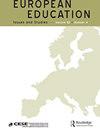不同学校情境下学生自主与受控动机:信任的作用
IF 0.3
Q4 EDUCATION & EDUCATIONAL RESEARCH
引用次数: 1
摘要
摘要考虑到关联性对学习动机的重要性,动机可能与教师对学生的信任有关,因此也与学校的学生构成有关。在2013/2014学年末(2014年4月- 5月)收集的57所佛兰德中学5162名学生和1247名教师的佛兰德代表性数据表明,教师对学生的信任与学生自主动机之间的关系是通过学生对教师的信任来实现的。在社会经济学生构成较高的学校,学生的自主动机较少,但这并不是因为教师的信任度高,这产生了更多的自主动机-通过学生对教师的信任。本文章由计算机程序翻译,如有差异,请以英文原文为准。
Students’ Autonomous and Controlled Motivation in Different School Contexts: The Role of Trust
Abstract Given the importance of relatedness for study motivation, motivation might be associated with faculty trust in students and, as such, with schools’ student composition. Representative Flemish data of 5162 students and 1247 teachers in 57 Flemish secondary schools, gathered at the end of the 2013/2014 school year (April–May 2014), reveal that the association between faculty trust in students and students’ autonomous motivation goes through students’ trust in teachers. In schools with a higher socioeconomic student composition, students are less autonomously motivated, but this does not show because faculty trust is high, which generates more autonomous motivation—via students’ trust in teachers.
求助全文
通过发布文献求助,成功后即可免费获取论文全文。
去求助
来源期刊

European Education
EDUCATION & EDUCATIONAL RESEARCH-
CiteScore
1.20
自引率
0.00%
发文量
5
期刊介绍:
uropean Education is published in association with the Comparative Education Society in Europe (CESE). It is an international peer-reviewed journal devoted to original inquiries and dialogue on education across the member states of the Council of Europe. Established in 1969, the journal features articles on education in individual member states, comparative studies on education across Europe, as well as the impact of European education initiatives globally. The journal especially encourages theoretical and empirical studies, interdisciplinary perspectives, and critical examination of the impact of political, economic, and social forces on education. European Education includes reviews of books and educational films, including those published/produced in English and other languages.
 求助内容:
求助内容: 应助结果提醒方式:
应助结果提醒方式:


